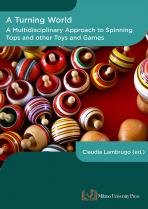A Turning World: a Multidisciplinary Approach to the Spinning Top and other Toys and Games
Synopsis
This volume presents the results of a research project carried out by a team at the University of Milan. Since meeting almost 'for fun' in 2009, this team has grown over the years, and has now a place in international research on the value of playful activities and artifacts.
More precisely, this publication is associated with the LALLACT project (Lexicon of Ancient Ludonims, Ludic Activities, and Cultural Tradition), which is dedicated to creating a digital Lexicon of games, starting with the spinning top and blind man's buff. The collected essays represent the outcome of a fruitful interdisciplinary discussion on these two games.
More specifically, the miscellaneous volume proposed here is linked to the LALLACT project - Lexicon of Ancient Ludonims project. Ludic Activities and Cultural Tradition, whose ambitious goal is the creation of a prototype of a digital Lexicon of the game, starting from two 'pilot' voices, respectively the game of the spinning top and blind man's buff. The collected essays constitute the outcome, precious and at times unexpected, of a fruitful multidisciplinary discussion on the topics indicated.
Chapters
-
The Spinning Tops of Hemaka
-
Where do the Children Play? Some Thoughts on Toys in the Ancient Near East during the 3rd Millennium BCE
-
Fiasche a trottola e Celti cisalpini
-
May a Spinning Top become a Chest? New Insights into the Cultural Meaning of Spinning Tops in Early Iron Age Athens
-
From Whom Did the Top Spin? A Boeotian Spinning Top in Context
-
Volitans sub vertere turbo. Osservazioni sull’iconografia del gioco della trottola nella ceramica greca e magnogreca
-
Trottole/palei dal tempio della Magna Mater sul Palatino a Roma
-
Il giocatore di trottola: osservazioni su una rara iconografia della piccola plastica antica
-
Motivazioni semantiche del nome della trottola tra India ed Europa orientale. Esplorazioni e riflessioni
-
La trottola nella lessicografia dialettale lombarda tra Settecento e Ottocento
-
Moscacieca nella lessicografia dialettale lombarda sette-ottocentesca
-
Nescio quo turbine agor: turbine o trottola di Eros? (Nota a Ovidio, Amori, 2.9.27-28)
-
Pedagogia della trottola tra Medioevo e Modernità: sistemi, sostituzioni e opposizioni
-
La peonza de Dios. Nicolás de Cusa y la construcción de una metáfora teológica
-
La trottola e il gioco della letteratura
-
La trottola come oggetto di riflessione scientifica
-
Children’s Spinning Tops in North Africa and the Sahara
-
Great Team at Play
-
Toys and Games: Reflections and New Perspectives
Downloads


This work is licensed under a Creative Commons Attribution-ShareAlike 4.0 International License.
